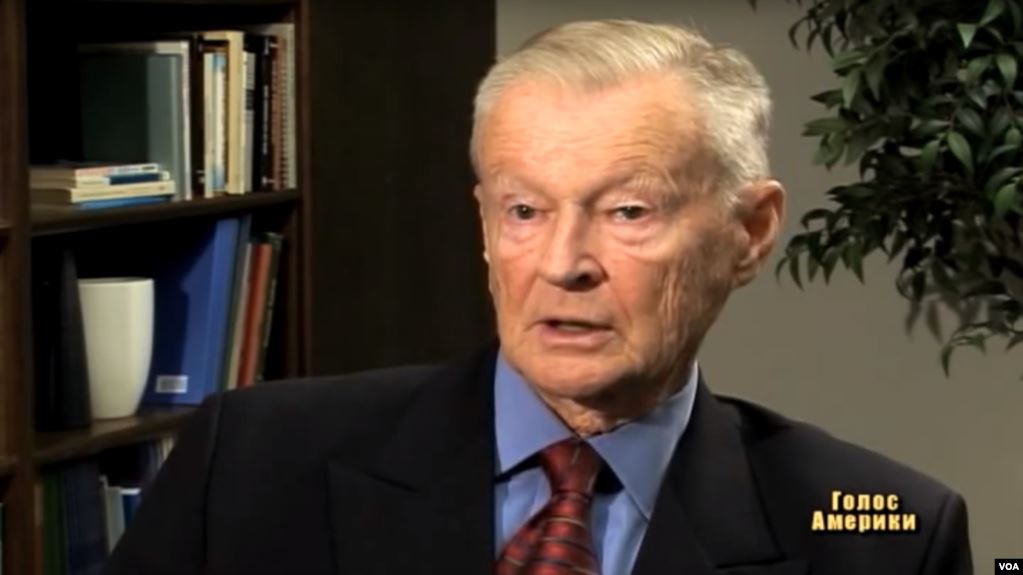
By Polygraph
“The Alliance [NATO] frankly follows the precepts of Brzezinski: ‘The twenty-first century will be built at the expense of Russia, on the ruins of Russia and against Russia’.”
False
The quote does not exist in Brzezinski’s published works
On October 3, Svobodnaya Pressa, the news portal linked to Zakhar Prilepin, a famous Russian novelist and a right-wing radical, attributed to Zbigniew Brzezinski the following quote: “The twenty-first century will be built at the expense of Russia, on the ruins of Russia and against Russia.” The quote was used in the context of a claim that NATO, in its “war with Russia,” was following Brzezinski’s precept.
Zbigniew Brzezinski was the U.S. diplomat and political scientist of Polish decent who authored several books and advised American leaders for decades. Brzezinski died in May 2017 at the age of 89.
While the Svobodnya Pressa report did not cite the source for the quote, multiple variations of the same quote have been circulating for years throughout the Russian media and repeated by the country’s top newsmakers, including State Duma deputy Natalia Narochinitskaya and Academy Award-winning movie director Nikita Mikhalkov.
In its May 2017 obituary of Brzezinski, the Russian edition of Esquire magazine cited a slightly different version of the same quote, attributing it to Brzezinski’s 1997 book “The Grand Chessboard”:
“Here is what he wrote in his famous book ‘The Great Chessboard” (published in 1997): ‘The New World Order will be built against Russia, on the ruins of Russia and at the expense of Russia. We destroyed the Soviet Union, we will destroy Russia. You don’t stand a chance’.”
After examining Brzezinski’s published works, as well as interviews with people who were close to him, Polygraph.info concludes that the quote is fake.
The quote that Esquire attributed to Brzezinski’s “The Grand Chessboard: American Primacy and Its Geostrategic Imperatives” in fact, does not appear in the book.
Other Russian media have reported that the quote came from a speech Brzezinski gave in Lviv, Ukraine on September 24, 1998, as he was accepting honorary citizenship from the city council. That is also false: nothing resembling the quote is in the transcript of the speech.
“Very doubtful he said anything like that. Not his style or lingo,” Ian Brzezinski told Polygraph.info regarding the attribution of the quote to his father.
Janusz Bugajski, Senior Fellow at the Center for European Policy Analysis, a Washington, DC think tank, who was Brzezinski’s friend and colleague for over 30 years, told Polygraph.info: “This is manufactured propaganda. And it is not so much about Zbig, it’s about the fears within Moscow that this empire that they are still maintaining is threatened with collapse, so they are looking now for scapegoats, even the scapegoats that are unfortunately no longer with us, to justify their campaign against the West.”
Former U.S. State Department foreign policy adviser Paul Goble suggested that the quote was fabricated intentionally. “I think the Russians extrapolated from what ZB actually said in order to make their point more dramatic,” Goble told Polygraph.info, adding that such manipulation “also serves their purposes by blaming someone who is no longer with us, was associated with the Democrats, and is a convenient punching bag.”
Glen Howard, president of the Jamestown Foundation, a Washington, DC think-tank, told Polygraph.info: “This seems like sort of a vast distortion. Brzezinski never went around talking about the ‘ruins of Russia;’ that is way below his style of speaking, which was always eloquent and nuanced and always in the style of a gentleman. This to me seems like some sort of fabricated phrase that the Russians would make up and use and spread to falsify what he actually said.”
“The Russian governments since the communist time have accused Zbig of wanting to destroy the Soviet Union and destroy Russia, but nowhere in his texts, nowhere in his speeches is there any evidence that he had advocated this,” Bugajski added.
“What he was saying was quite the opposite — that there is hope for Russia as its younger generation, which has not experienced communism, hopefully will turn away from this national-imperialist project and turn towards democracy and international cooperation. What he has said, which is much more important, is that for Russia to become a country with which the U.S. can cooperate, it needs to revoke any imperial pretensions, what he called ‘imperial nostalgia,’ to create good relations with countries such as Ukraine and Georgia and others, and to democratize internally.”





